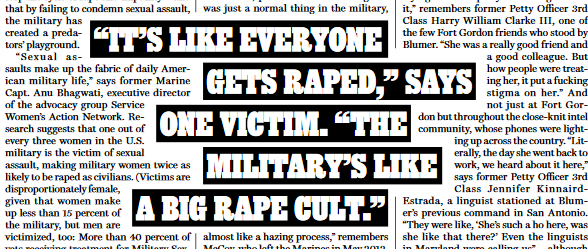


By Eugene Gant
12/11/2014
Writer behind the UVA rape hoax also wrote this piece of "sex abuse" in the military https://t.co/h7XMM74Eeh I’m sure it’s 100% accurate
— Roosh (@rooshv) December 6, 2014
Apropos of James Fulford’s analysis of Rebecca Blumer’s “rape” in the Navy, reported by none other than Sabrina Rubin Erdely, readers should read carefully the account of Lance Cpl. Nicole McCoy. Fulford concentrated on the improbabilities of Blumer’s story, but the other accounts inspire skepticism as well.
These are the excerpts about McCoy from Erdely’s tale:
Excerpt 1:
Just ask 23-year-old Lance Cpl. Nicole McCoy, who was assaulted so often during her four-year stint that she came to regard it as an unavoidable, even sanctioned, part of service. “I thought it was just a normal thing in the military almost like a hazing process,” remembers McCoy, who left the Marines in May 2012. “It seemed like everyone gets raped and assaulted and no one does anything about it; it’s like a big rape cult.”
Excerpt 2:
“He was my superior,” explains former marine Nicole McCoy of why, when in April 2010 her alleged assailant groped and kissed her, it didn’t occur to her to scream or, despite her combat training, to fight. “You’re taught to be nothing but respectful. It makes it hard to stand up for yourself, or to report it.” McCoy was able to extricate herself, but decided to report the assault attempt when she realized her assailant had the master key to her quarters.The investigating agent asked McCoy whether she sustained injuries while fighting off her superior’s advances. “No,” she answered. “But emotionally I felt completely violated and didn’t feel I had the right to say no and have him stop.” The agent persisted, asking McCoy why she’d followed the sergeant into his room, why she didn’t object when he closed the door, and what she’d been wearing. Her case was swiftly closed.
Excerpt 3 (from a graphic with McCoy’s photo) in the PDF of the print edition:
She was assaulted so often that she came to see it “almost like a hazing process.”
This last claim is repeated by Forbes in its piece about sexual assault in the military:
Nicole McCoy, 22, served as a Lance Corporal in the Marines for three years. In that time, McCoy was raped twice and sexually assaulted on two other occasions. “I didn’t know how to report it or who to tell,” McCoy says. “It felt like it was just a normal thing, to be raped, if you were a woman in the military.”
Questions:
This woman .thought rape was permitted? She was raped twice and assaulted twice and didn’t report it? After years of anti-male feminist indoctrination in the schools and from the media, this young, 21st-century woman didn’t “feel I had the right to say no and have him stop,” and “didn’t know how to report it or who to tell” because “it was a normal thing?”
Does anyone believe that?
Erdely repeated the military’s claim that 3,192 sex assaults occurred in armed forces in 2011, although Erdely, writing in 2013, called it last year’s figure, which is incorrect. In 2012, the figure was 3,374, The New York Times reported. That’s about nine every day. Is that possible?
Then there’s this. In that same piece, the Times reported that the Pentagon thinks 26,000 military men and women were sexually assaulted in 2012. That’s about 70 every day. Like the “one-in-five” number for women raped on campus, this number is bunk.
In 2013, the FBI reported about 80,000 rapes for the entire country of more than 316 million. Is the number of rapes in the military, with 3 million members, or 0.9 percent of the population, really 32 percent of that for the entire country?
In Slate, Emily Yoffe expressed her own skepticism over college rape numbers:"The one-fifth to one-quarter assertion would mean that young American college women are raped at a rate similar to women in Congo, where rape has been used as a weapon of war."